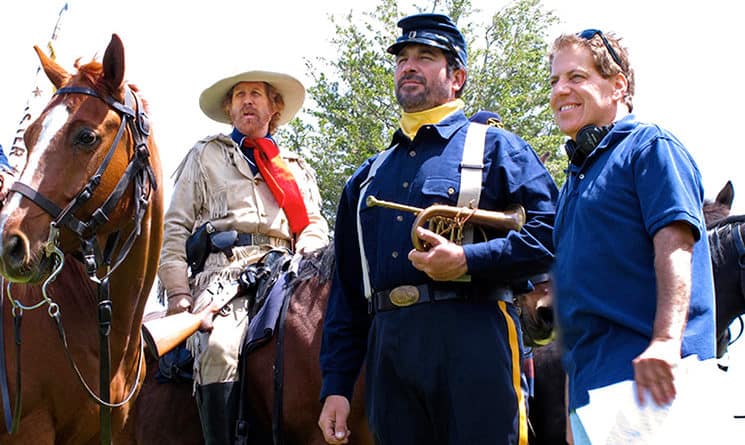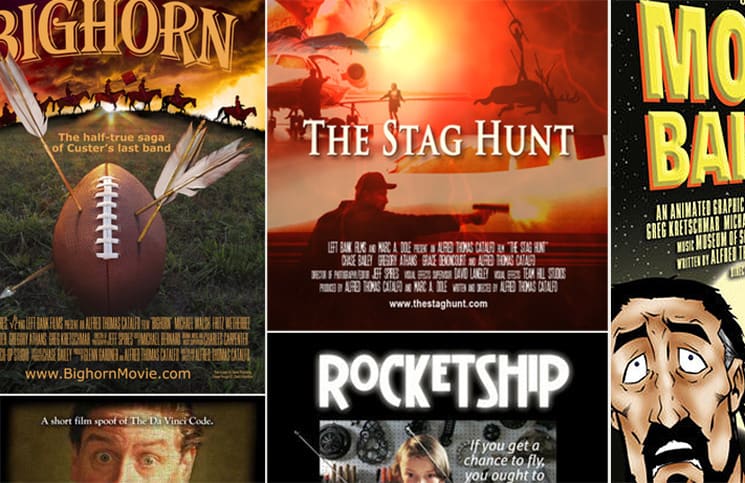In “Bighorn,” Dover filmmaker Alfred Thomas Catalfo’s 2010 short film, a haunted coronet transports a Harvard professor back to the Battle of Little Big Horn in 1876. It was a fateful moment for Lt. Col. George Custer, who was killed alongside all his troops in the battle. And, in a way, it was a fateful moment for New England sports fans. When Custer charged into battle, he left his band, led by coronet player Felix Vinatieri, behind (at least, according to Catalfo’s telling of the story). That twist of fate meant that, more than a century later, Vinatieri’s great-great-grandson, Adam Vinatieri, could help the New England Patriots clinch a 2002 Super Bowl victory with a last-second field goal.
Catalfo’s experience filming “Bighorn” brought him to some strange places. The oddest of all was a large-scale re-enactment of the famous battle, where he portrayed a reporter accompanying Custer’s ill-fated campaign, dodged horses, avoided rattlesnakes, and, of course, died right on cue.
“As a filmmaker, you have experiences you’d never have otherwise,” Catalfo says.
The latest of those experiences is a one-night-only retrospective of Catalfo’s work. Hosted by the Rochester Opera House, the Catalfo Film Festival takes place on Saturday, Nov. 21, featuring six of the director’s short films.
Catalfo might be best known for “The Norman Rockwell Code,” a spoof of “The Da Vinci Code” that he released in 2006. It was his first “real” film, he says, and it attracted a lot of attention. He released it online the same day that “The Da Vinci Code” opened; he made it into Entertainment Weekly’s “Must List” feature, and after a month, the film had racked up a million views — which, back in 2006, was no small accomplishment.
“I like taking historical incidents and building a ‘Twilight Zone’ episode out of them,” he says. “History has always fascinated me because some of the things that have happened are truly stranger than fiction. It’s like peeling away an onion — there are even many levels to the truth.”
Catalfo is a personal injury lawyer by profession; he’s been practicing law for more than two decades. Filmmaking has been a long-time passion for Catalfo. He got his start in the 1980s, when he made a music video for his band, Friday, and submitted it to MTV’s “Basement Tapes” show. That got him thinking like a filmmaker, and while in law school, he wrote scripts and submitted them to competitions.
“I wanted to see what it was like to get something made,” he says.
Since “The Norman Rockwell Code,” Catalfo has directed six other shorts, including “Moonlight Bait and Ammo,” an “animated graphic novel” about an arrogant insurance company investigator who travels to rural Maine to debunk a claim about a destructive alien, and “SlamMan,” about a robot boxer.
Making films and practicing law aren’t so different, according to Catalfo. “When you practice law, you’re seeing people at these dramatic, emotional highs and lows,” he says. Seeing that and hearing people’s stories help him write characters. And, he adds, both jobs require some serious storytelling skills.
“There are directors who can be very technical … but I’m more about the story and the performances,” he says. “I like being hands-on with my actors and the story.”
That attitude gives Catalfo’s films a comfortable, friendly feel. He tends to work with the same actors and crew (for example, Mike Walsh, who plays the lead in “The Norman Rockwell Code,” shows up in “Bighorn”), and his two children, Gina and Freddie, have also pitched in. The films are all low-budget — most are done for less than $5,000, Catalfo says — and so his emphasis is on clever concepts and gathering enthusiastic collaborators.
Along the way, he’s collected a host of awards. His daughter, Gina, has started her own filmmaking career. Her short, “Signing” recently screened at the Somewhat North of Boston film festival in Concord and the New Hampshire Film Festival in Portsmouth.
“Shorts are kind of the last bastion for truly independent filmmakers,” Catalfo says.
While the festival is a chance for Catalfo to look back on his body of work (this is the first time he’ll ever see all his short films together), he is focused on the future. He recently finished shooting his latest short, “A Split Ticket,” about the train ride then-senators Richard Nixon and John F. Kennedy took following a debate in 1947 (there’s a twist, of course). He expects the film to be completed early next year. Meanwhile, “Oil and Water,” the screenplay he wrote with co-writer Morgan Dudley about the 1974 fight to prevent Aristotle Onassis from building an oil refinery in Great Bay, has won a host of screenwriting competitions and is attracting interest from studios.
“There have been a lot of conference calls,” Catalfo says.
He’s also working on ideas for a feature-length film. “A Split Ticket” will be his eighth short film; shorts are a way to “learn how to develop your craft” and a “calling card to get to the next level,” Catalfo says. Though he’s not sure which idea will pan out for a feature, the film will likely reflect Catalfo’s philosophy as an independent filmmaker.
“You have to make up for what you lack in a high budget and big stars with a super creative idea,” he says. If Catalfo’s films so far are any indication, that shouldn’t be a problem.
The Catalfo Film Festival takes place Saturday, Nov. 21 at 7:30 p.m. at the Rochester Opera House, 31 Wakefield St., Rochester. Tickets are $7, available at 603-335-1992 or at rochesteroperahouse.com.


